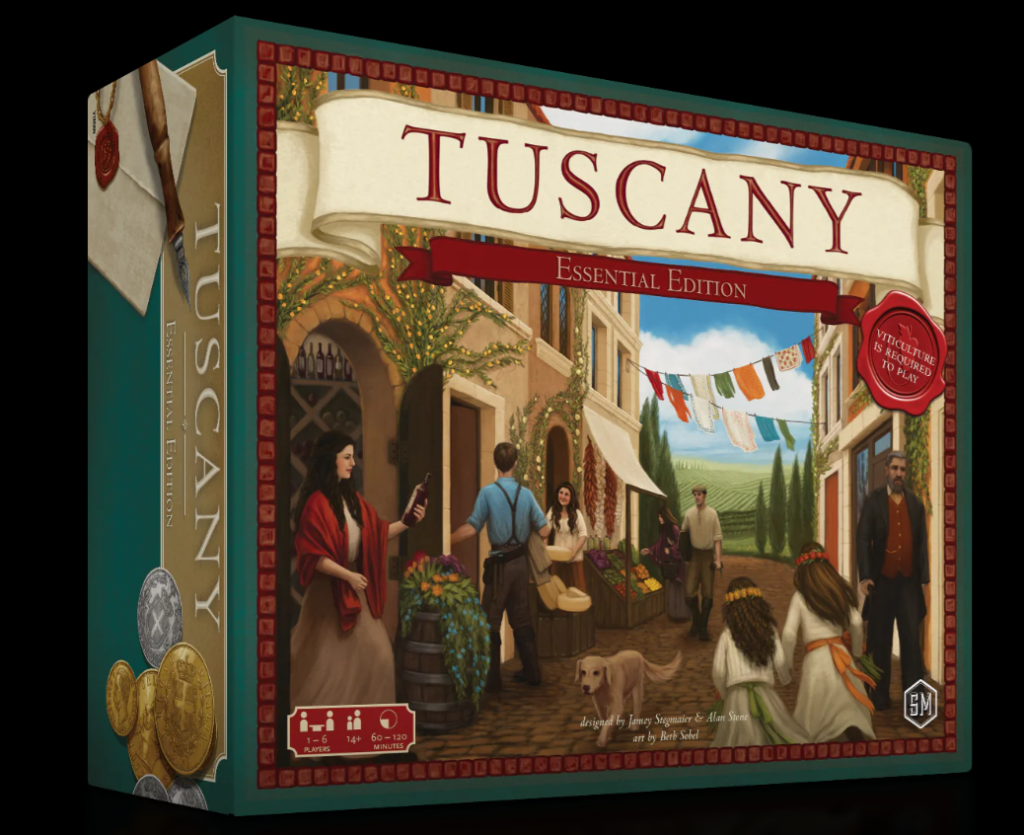The Tuscany expansion for Viticulture, designed by Jamey Stegmaier and published by Stonemaier Games, is a major addition to the core Viticulture game. It deepens and broadens the winemaking theme, adding new layers of strategy and complexity. The expansion introduces three main modules: Extended Board, Structures, and Special Workers, each of which can be added to the base game either individually or in combination. The expansion enhances the focus on resource management, worker placement, and strategic planning while keeping the core elements of winemaking at the heart of the experience.
Pros:
- Extended Board Adds Depth: The new extended board adds a fourth season, dividing actions more evenly throughout the year and giving players more strategic choices. This changes the pacing of the game, making it more dynamic and opening up more opportunities for timing and resource management.
- Special Workers for Varied Play: The introduction of special workers adds a new layer of strategy. Each special worker has a unique ability, which can help players execute their plans more efficiently and create new paths to victory. This addition brings more variability and replayability to the game.
- Structures Add New Tactics: The Structures module introduces custom buildings that players can construct on their personal vineyard boards. These buildings provide unique benefits and allow players to develop different strategies from game to game. This module increases player agency and offers fresh decision-making opportunities.
- Replayability and Modular Design: Tuscany’s modular design allows players to introduce one, two, or all three modules as they see fit. This modularity enhances the replayability of the game, as players can mix and match different elements to create a variety of gameplay experiences.
- Increased Strategic Depth: Overall, the expansion increases the strategic depth of Viticulture without feeling overly complex. The added options for placing workers and managing resources allow for more long-term planning and flexibility.
- High-Quality Components: Tuscany continues Stonemaier Games’ tradition of high-quality components, including sturdy boards, detailed cards, and beautiful artwork that seamlessly integrates with the base game.
Cons:
- Longer Playtime: The added mechanics and increased complexity inevitably lead to longer play sessions. For players who prefer a quicker, more streamlined experience, this might be a downside, especially when using all three modules together.
- Steeper Learning Curve: While Viticulture itself is fairly accessible, the Tuscany expansion introduces several new mechanics that can increase the learning curve, particularly for new players. Teaching the full expansion to a group unfamiliar with the base game can be a bit daunting.
- Potential for Analysis Paralysis: The increased number of choices and strategic options can lead to analysis paralysis, particularly for players who enjoy optimizing their actions. The added decision-making might slow down the pace of the game, especially in larger groups.
- Special Workers Can Be Overpowered: Some players may find that certain special workers feel overpowered compared to others, which can lead to balance issues. This can sometimes make the game feel less fair, especially if one player draws a particularly advantageous combination of workers.
- Not Ideal for Casual Play: Tuscany is best suited for dedicated gamers who enjoy longer, more complex games. For casual players or those who prefer the lighter, quicker feel of the base game, Tuscany’s added complexity might feel overwhelming or unnecessary.
Comparison to Similar Games:
The Tuscany expansion can be compared to other games or expansions that enhance worker placement and resource management mechanics, such as Agricola: Farmers of the Moor and Lords of Waterdeep: Scoundrels of Skullport.
- Agricola: Farmers of the Moor: Like Tuscany, this expansion adds new layers of complexity to Agricola, increasing strategic depth and variability. Both expansions add more options and replayability but also increase the game’s learning curve and length. However, Tuscany is more modular, allowing players to gradually introduce new mechanics, while Farmers of the Moor is a more comprehensive expansion that alters the core experience more significantly.
- Lords of Waterdeep: Scoundrels of Skullport: This expansion for Lords of Waterdeep adds new buildings, corruption mechanics, and intrigue cards, much like Tuscany’s structures and special workers. Both expansions increase the complexity and strategic options of the base game. However, while Skullport introduces more direct conflict through corruption, Tuscany’s complexity comes from deeper strategic planning and long-term resource management.
Summary:
The Tuscany expansion for Viticulture is a must-have for fans of the base game who are looking to deepen their strategic experience and increase replayability. The extended board, special workers, and structures modules each add significant new mechanics that complement the base game’s winemaking theme. While the increased complexity, longer playtime, and potential for analysis paralysis may not appeal to all players, those who enjoy strategic planning and resource management will find Tuscany to be a rewarding and enriching expansion. The modular nature of the expansion allows players to tailor the experience to their preferences, making it a versatile and well-designed addition to Viticulture.
And remember, Frontline Gaming sells gaming products at a discount, every day in their webcart!

